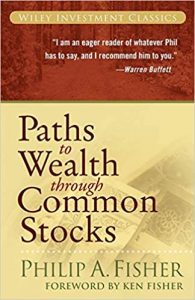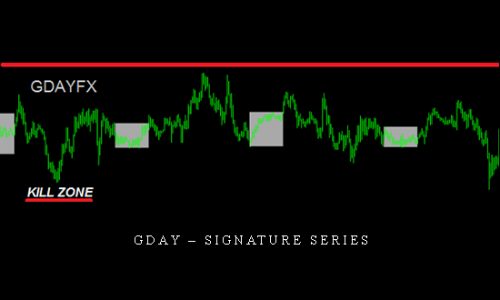
Paths to Wealth Though Common Stocks by Philip A.Fisher
Paths to Wealth through Common Stocks contains one original concept after another, each designed to greatly improve the results of those who self-manage their investments — while helping those who rely on professional investment advice select the right advisor for their needs.
Originally written by investment legend Philip A. Fisher in 1960, this timeless classic is now reintroduced by his well-known. And respected son, successful money manager Ken Fisher, in a new Foreword.
Filled with in-depth insights and expert advice, Paths to Wealth through Common Stocks expands upon the innovative ideas found in Fisher’s highly regarded Common Stocks and Uncommon Profits — summarizing how worthwhile profits have been and will continue to be made through common stock ownership, and revealing why his method can increase profits while reducing risk. Many of the ideas found here may depart from conventional investment wisdom, but the impressive results produced by these concepts — which are still relevant in today’s market environment — will quickly remind you why Philip Fisher is considered one of the greatest investment minds of our time.
Get Paths to Wealth Though Common Stocks by Philip A.Fisher on Traderknow.com
From the Back Cover
Paths to Wealth through Common Stocks contains one original concept after another, each designed to greatly improve the results of those who self-manage their investments—while helping those who rely on professional investment advice select the right advisor for their needs.
Originally written by investment legend Philip A. Fisher in 1960, this timeless classic is now reintroduced by his well-known. And respected son—successful money manager Ken Fisher—in a new Foreword.
Filled with in-depth insights and expert advice, Paths to Wealth through Common Stocks expands upon the innovative ideas found in Fisher’s highly regarded Common Stocks and Uncommon Profits—summarizing how worthwhile profits have been and will continue to be made through common stock ownership. And revealing why his method can increase profits while reducing risk. Many of the ideas found here may depart from conventional investment wisdom. But the impressive results produced by these concepts—which are still relevant in today’s market environment—will quickly remind you why Philip Fisher is considered one of the greatest investment minds of our time.
Get Paths to Wealth Though Common Stocks by Philip A.Fisher on Traderknow.com
About the Author
PHILIP A. FISHER (1907–2004) began his career as a securities analyst in 1928 and founded Fisher & Company, an investment counseling business, in 1931. He is known as one of the pioneers of modern investment theory. After writing this book, Fisher taught at Stanford as one of only three to ever teach the Graduate School of Business Investment Management course. His other writings include investment classics such as Common Stocks and Uncommon Profits, Conservative Investors Sleep Well, and Developing an Investment Philosophy.
KEN FISHER is best known for his prestigious “Portfolio Strategy” column in Forbes magazine, where his twenty-three-year tenure of high-profile calls makes him the fourth longest-running columnist in Forbes’s ninety-year history. Ken is the founder, Chairman, and CEO of Fisher Investments, a multi-product money management firm with over $40 billion under management. His success has ranked him #297 on the 2006 Forbes 400 list of richest Americans. He is a regular in the media and has appeared in most major American finance or business periodicals. Fisher also recently authored the New York Times bestseller The Only Three Questions That Count, also published by Wile
Get Paths to Wealth Though Common Stocks by Philip A.Fisher on Traderknow.com
Stock trading course: Learn about Stock trading
A stock trader or equity trader or share trader is a person or company involved in trading equity securities.
Stock traders may be an agent, hedger, arbitrageur, speculator, stockbroker.
Such equity trading in large publicly traded companies may be through a stock exchange.
Stock shares in smaller public companies may be bought and sold in over-the-counter (OTC) markets.
Stock traders can trade on their own account, called proprietary trading. Or through an agent authorized to buy and sell on the owner’s behalf.
Trading through an agent is usually through a stockbroker. Agents are paid a commission for performing the trade.
Major stock exchanges have market makers who help limit price variation (volatility) by buying. And selling a particular company’s shares on their own behalf and also on behalf of other clients.
Also Get Paths to Wealth Though Common Stocks by Philip A.Fisher on Traderknow.com
Visit more course: FOREX TRADING COURSE
The same course: Bill Williams Eduard Altmann SMB Simpler Trading Van Tharp Atlas Api Training Trading Template Sunil Mangwani Sunil Mangwani Frank Paul . Also Market Delta Tradingacademy Simplertrading Urbanforex. Also Candlechartscom Dan Sheridan Pipsociety Atlas Api Training TopTradeTools Todd Mitchell Jerry Singh OpenTrader Alexandertrading Daytradingzones
Please contact email: [email protected]
Course Features
- Lectures 0
- Quizzes 0
- Duration 40 hours
- Skill level All levels
- Language English
- Students 92
- Assessments Yes








